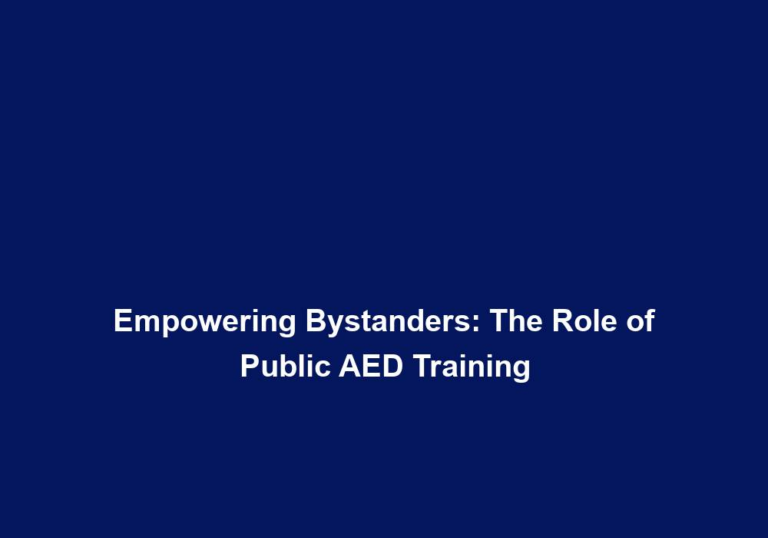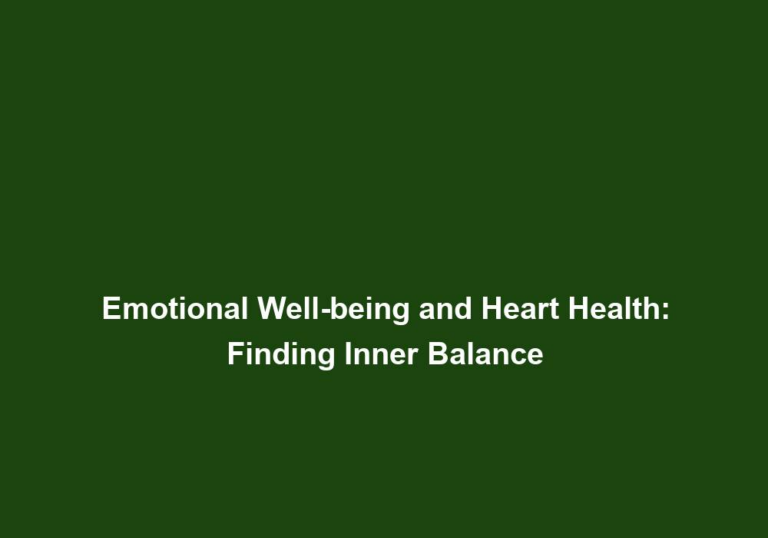Stress and Heart Health: Strategies for a Calmer Life
In today’s fast-paced world, stress has become an inevitable part of our lives. The demands of work, family, and daily responsibilities can all contribute to heightened stress levels. Unfortunately, chronic stress can take a toll on our physical and mental well-being, including our heart health. In this article, we will explore effective strategies that can help you lead a calmer life and promote a healthy heart.
Understanding the Link between Stress and Heart Health
Before diving into the strategies, it’s important to understand the connection between stress and heart health. When we experience stress, our body releases hormones like adrenaline and cortisol, which can elevate blood pressure and increase heart rate. Over time, chronic stress can lead to long-term heart problems, including high blood pressure, heart disease, and even heart attacks.
Stress affects the cardiovascular system in several ways. It can lead to the constriction of blood vessels, making it harder for blood to flow freely. This can increase the workload on the heart and raise blood pressure. Chronic stress can also contribute to the accumulation of plaque in the arteries, which can lead to atherosclerosis and increase the risk of heart disease. Furthermore, stress can disrupt normal heart rhythms, potentially leading to arrhythmias.
Strategies for Managing Stress
-
Exercise Regularly: Engaging in physical activity is one of the most effective ways to reduce stress. Exercise stimulates the production of endorphins, which are natural mood enhancers. Regular exercise also helps improve cardiovascular health, reducing the risk of heart disease. Aim for at least 30 minutes of moderate-intensity exercise, such as brisk walking, jogging, or cycling, most days of the week. Incorporate activities you enjoy, such as dancing, swimming, or playing a sport, to make it a sustainable habit.
-
Practice Deep Breathing: Deep breathing exercises help activate the body’s relaxation response and reduce stress. Find a quiet place, sit or lie down comfortably, and take slow, deep breaths in through your nose, allowing your abdomen to rise, and exhaling slowly through your mouth. Deep breathing increases oxygen supply to the body and promotes a sense of calm. Repeat this for a few minutes whenever you feel stressed, and consider incorporating it into your daily routine for overall well-being.
-
Prioritize Sleep: Lack of sleep can contribute to increased stress levels. Make sure to establish a regular sleep routine, aiming for 7-9 hours of quality sleep each night. Create a relaxing environment in your bedroom by keeping it cool, dark, and quiet. Avoid electronic devices before bedtime, as the blue light emitted by screens can interfere with sleep. Consider incorporating relaxation techniques, such as meditation or reading, into your bedtime routine to promote better sleep.
-
Practice Mindfulness and Meditation: Mindfulness and meditation techniques can help calm the mind and reduce stress. Take a few minutes each day to focus on the present moment, paying attention to your thoughts and feelings without judgment. This can be done through simple activities like mindful breathing or body scans, or by using smartphone apps that offer guided meditations and mindfulness exercises. Regular practice can enhance self-awareness, reduce anxiety, and promote a sense of overall well-being.
-
Maintain a Healthy Diet: A well-balanced diet plays a vital role in managing stress and promoting heart health. Include plenty of fruits, vegetables, whole grains, lean proteins, and healthy fats in your meals. These nutrient-rich foods provide antioxidants and essential nutrients that support heart health. Avoid excessive caffeine, sugary foods, and processed snacks, as they can contribute to increased stress levels. Instead, opt for herbal teas, dark chocolate, and nuts as healthier alternatives.
-
Get Social Support: Sharing your thoughts and feelings with trusted friends or family members can help alleviate stress. Surround yourself with a support system that understands and supports you. Consider joining support groups or engaging in activities that allow you to connect with like-minded individuals. Social support provides a sense of belonging, reduces feelings of loneliness, and strengthens resilience in the face of stress.
-
Practice Time Management: Feeling overwhelmed and stressed often stems from poor time management. Prioritize your tasks, set realistic goals, and break them down into manageable steps. Learn to delegate when possible and avoid overcommitting yourself. This will help reduce stress and create a sense of accomplishment. Use productivity tools or techniques like the Pomodoro Technique to stay focused and organized.
-
Engage in Relaxation Techniques: Explore different relaxation techniques that work best for you. This could include listening to calming music, taking a warm bath, practicing yoga or tai chi, or engaging in hobbies that bring you joy and help you unwind. Find activities that help you relax both physically and mentally, and incorporate them into your routine as a way to combat stress.
-
Limit Exposure to Stressors: Identify sources of stress in your life and take steps to reduce or eliminate them. If certain situations or people consistently cause stress, consider establishing boundaries or seeking professional help to develop coping strategies. Avoiding unnecessary stressors can improve your overall well-being and reduce the burden on your heart.
-
Seek Professional Help: If you find that stress is significantly affecting your daily life and overall well-being, don’t hesitate to seek help from a mental health professional. They can provide guidance, support, and therapeutic interventions to help you manage stress effectively. A professional can help you develop personalized strategies to cope with stress and improve your heart health. Remember, seeking help is a sign of strength, and it can make a significant difference in your overall quality of life.
Remember, managing stress is crucial for maintaining a healthy heart. By implementing these strategies into your lifestyle, you can reduce stress levels, promote overall well-being, and protect your heart health in the long run.
Article generated using OpenAI’s GPT-3 language model.







